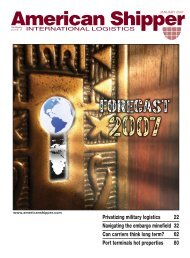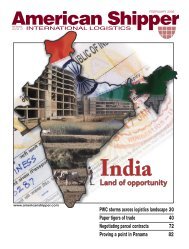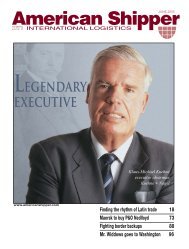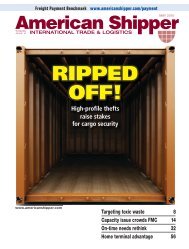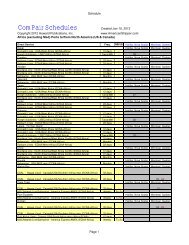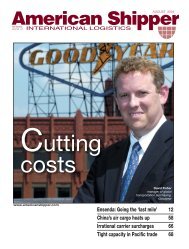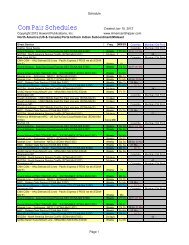Pirate Busters - American Shipper
Pirate Busters - American Shipper
Pirate Busters - American Shipper
Create successful ePaper yourself
Turn your PDF publications into a flip-book with our unique Google optimized e-Paper software.
LOGISTICS<br />
Giving degrees of freedom<br />
Irresponsibly changing strategies<br />
brings Deep’s temperature to a boil.<br />
The bleak economic<br />
climate is finally<br />
having an impact on<br />
my mood — not because of<br />
the financial situation, but<br />
because of the ridiculous<br />
things we are seeing being<br />
implemented under the guise<br />
of “strategy,” “tactics” and<br />
“market readiness” for the<br />
upswing.<br />
Business leaders are heading<br />
down a silly and dangerous<br />
path with the things they<br />
are making their businesses<br />
do, taking the adage “never<br />
waste a good crisis” a little<br />
too seriously and going a<br />
little too far. Used irresponsibly,<br />
changing strategy or<br />
tactics can seriously harm a<br />
business and erode its ability<br />
to respond to changes in the marketplace.<br />
Cutting their wings, so to speak.<br />
Case in point<br />
Take for instance one of our clients,<br />
who decided sometime last year to became<br />
obsessive with supply chain cost-cutting,<br />
hence pretty much disallowing all transshipments.<br />
Not a bad thought, considering<br />
how many times this is done due to lack<br />
of a sufficiently robust inventory policy or<br />
reflective of a business with a “sales-gonewild”<br />
phenomenon.<br />
Now, this is a good idea if, and only if,<br />
you’re going to change something that impacts<br />
the root cause of these transshipments.<br />
More recently, the client instituted a policy<br />
to lower working capital, targeting inventory<br />
at all of its distribution centers, without a<br />
formal inventory policy — across the board.<br />
Hence, the degrees of freedom have been<br />
cut significantly. If you can’t compensate<br />
for a bad demand signal through transshipments,<br />
then it’s logical to bolster inventory<br />
position to account for the demand variability.<br />
Obviously you would want to first look<br />
at the forecast to see if you can improve it.<br />
One of the ways to manage demand<br />
better is to stratify and segment products,<br />
which the client refuses to do — there goes<br />
another degree of freedom.<br />
So, the next option (we’re towards the end<br />
The<br />
Strategic<br />
View<br />
BY DEEP PAREKH<br />
of the list of options now!) is<br />
to segment service level by<br />
product, customer and DC,<br />
so as to provide adequate service.<br />
But the client insists on<br />
having nothing less than 100<br />
percent service level — do<br />
you hear that chopping sound<br />
on the degrees of freedom?<br />
The business has been driven<br />
to a point of being unable to<br />
operate systematically.<br />
Allowing degrees<br />
of freedom<br />
Going back to the client’s<br />
situation, there are<br />
still further options, such as<br />
changing inventory strategy<br />
and consolidating its very<br />
volatile product in a few DCs<br />
and then sourcing the region from the few<br />
DCs, thereby implementing “risk-pooling”<br />
logic, and consolidation. But the client<br />
is closed to this as well, because it will<br />
increase transportation costs. Its volatile<br />
product, as we discovered, is greatly due<br />
to certain product variations, which were<br />
“combination packs.” One of the alternatives<br />
possible is also to discuss with sales<br />
to focus its promotions on certain standard<br />
“multiples” (e.g. if you sell products in<br />
groups of four, then it would be greatly<br />
beneficial for sales to promote in increments<br />
of four, so as to be able to combine<br />
products at the very last moment), using<br />
principles of “product postponement.” But<br />
the client has not explored this possibility<br />
with other functions yet.<br />
Impact<br />
Not unexpectedly, everything has<br />
become an exception, and has forced everyone<br />
to be focused on day-by-day and<br />
hour-by-hour execution instead of planning<br />
to avoid the pitfalls that develop into<br />
execution crises.<br />
But this is only the superficial impact, felt<br />
in the here and now. In the near term (even<br />
one year out), the client will still be focused<br />
only on the short term, and will continue to<br />
suffer service issues and inventory imbalances<br />
because it is not looking further out<br />
to avoid the big things in the future. The<br />
client is sacrificing the Important for the<br />
Urgent, and not even realizing it, because<br />
they’re convinced that the Urgent is, in fact,<br />
the Important.<br />
Recovering from this will take another<br />
year or two, and quite possibly a change<br />
in leadership because of the underperformance<br />
that the business will suffer during<br />
the recovery (which is bound to come<br />
sooner or later).<br />
Further, the company will have cut the<br />
wings of its competitive growth engine of<br />
innovation because it’s never looking out<br />
far enough to actually plan and execute its<br />
innovations with sufficient rigor, discipline<br />
and, frankly, foresight.<br />
Deep R. Parekh is a partner with Equus<br />
Group LLC, a supply chain advisory services<br />
and management consulting firm<br />
based in New York and Sao Paulo, Brazil.<br />
He welcomes your feedback and comments<br />
at deep.parekh@equusllc.com, and can be<br />
contacted at (917) 940-7538. ■<br />
AMERICAN SHIPPER: OCTOBER 2009 17



